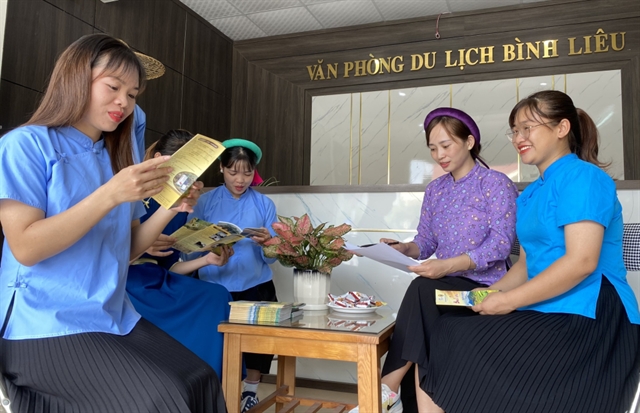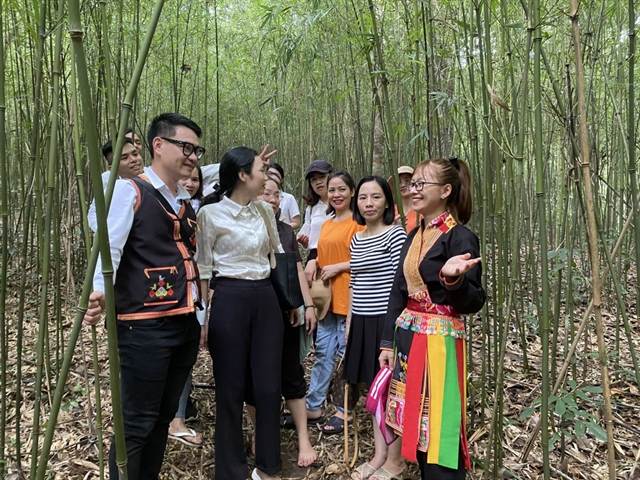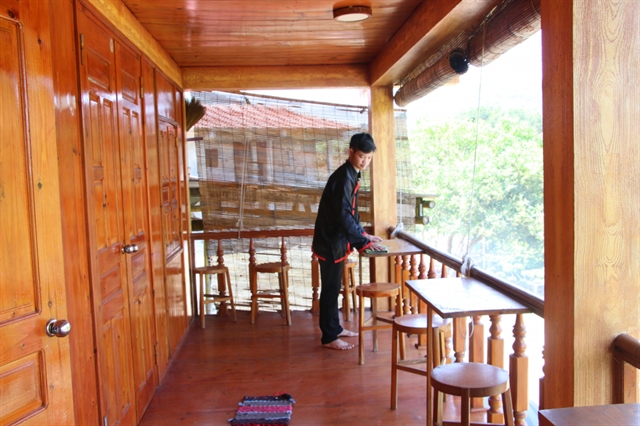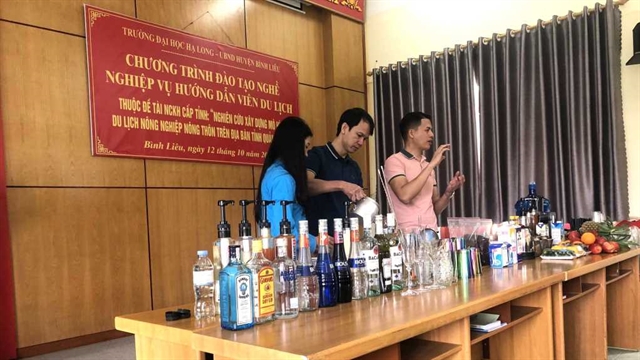Weather:
- Ha Noi 33oC
- Da Nang 28oC
- Ho Chi Minh 33oC
Several popular sightseeing spots in the northern coastal province of Quảng Ninh, including the UNESCO World Heritage site of Hạ Long Bay, have seen a surge in tourist numbers since the country lifted most pandemic restrictions a few months ago. However, the strong recovery has created a labour shortage throughout the tourist industry.
Currently, to ensure service quality, enterprises operating in hospitality and tourism are paying attention to attracting and improving their labour force's quality.
A regular meeting of on-site tour guides is held every week in Bình Liêu -- a multi-ethnic district that has become a new hotspot for tourists in recent years thanks to its cool climate and the stunning mountainous landscape, especially in the season of reeds flowers and ripe rice (September-October).

The meetings offer the tour guides, who all attended a training course hosted in the summer by the Quảng Ninh tourism authority, chances to discuss any issues and exchange their practical experiences, thus providing the best service for tourists.
Lô Thị Chung, an on-site tour guide, said: “The weekly meetings are beneficial because we can exchange necessary information related to our work. We also can learn from each other, thus improving our professional skills to serve our guests better.”
Earlier, to welcome tourists during the high season in autumn and winter, the district cooperated with reputable tourist agencies such as Hanoi Tourism to organise training courses for the district’s workforce, including tour guides and staff working in hotels and restaurants.
The courses have equipped attendees with up-to-date tourism information and knowledge on responsible tourism. The participants also have honed their skills in guiding and hospitality, communication skills, and how to promote a destination.
In Móng Cái City, with an increasing number of visitors, especially on weekends, business establishments offering tourist services have to speed up their recruitment and provide short-term training for newly recruited staff to raise their quality.
According to the head of Móng Cái City’s Culture and Information Unit, Phạm Thị Oanh, the city plans to organise vocational programmes for rural workers, including in cooking, room and table services, and bartending.
“We already hosted training courses on food and beverage service, accommodation, transportation, and entertainment services,” she said.
Alongside offering advanced courses for on-site tour guides, the city will soon introduce “electronic guides” using QR codes.

To ensure workforce quality, the Quảng Ninh tourism authority has actively attracted workers through local job fairs. It also helps connect tourist enterprises with vocational schools to recruit graduates.
Under the Master Plan for Quảng Ninh’s Human Resource Development for 2010-2020, the province prioritises developing human resources in critical economic sectors, including tourism.
Head of the Hạ Long City’s Culture and Information Unit, Nguyễn Mạnh Tuấn, said that the city had actively supported tourist enterprises to recruit workers by linking the enterprises and vocational schools.
Alongside encouraging tourism students to have internships in business establishments offering tourist services, the city has also designed advanced training programmes for people working in the sector.
Training locals to be tour guides
Aiming to develop the potential of community tourism in the new tourist spot of Bình Liêu, the district has the ambition to train local people to be tour guides.
To reach the goal, the district has cooperated with the provincial tourism authority to organise several training programmes targeting local people. Alongside equipping them with the necessary knowledge of tourism and hospitality, the programmes also introduce them to how to preserve their ethnic and cultural identity while developing tourism.

When ethnic Dao young man Lý Văn Vinh became the manager of his homestay A Dào in Đồng Văn Commune, he could only prepare a few traditional dishes and make the table. However, his basic skills were not enough to satisfy the guests when his homestay welcomed more tourists.
To meet their demands, he attended a training class on hospitality service co-organised by the Quảng Ninh Department of Tourism and the Bình Liêu District’s Culture and Information Unit. In addition, he has also accumulated his hospitality knowledge through the internet and from exchanging experiences with other homestay owners in Hạ Long and Sa Pa.
“I have also paid attention to every comment of my guests to improve our service quality. It’s great that now we have several loyal guests who return regularly to stay,” he said.
There are 400 people, excluding seasonal labourers, working in hotels, homestays, and restaurants in Bình Liêu. However, like Vinh, most haven’t been trained professionally.
In recent years, the district authority has coordinated with the provincial Department of Tourism and the Hạ Long University to open numerous training courses for people in their villages.
“Our purpose is for everyone to have the opportunity to access knowledge and skills in tourism,” said the head of the Bình Liêu District’s Culture and Information Unit, Mạc Ngọc Điệp.

The most recent course on tour guide skills was held in October, gathering 35 local people. The participants were knowledgeable about agricultural and rural tourism and its role in green growth and sustainable development. Knowledge of local sightseeing spots, skills in designing tour programmes, tour presentations, and handling occurrences were all part of the course.
The course attendees also were shown how to create drinks with local agricultural products.
Thanks to the course, Phùn Thị Hậu, who runs Xuân Quý Restaurant in Bình Liêu Town, said that she could now create the drink from trám đen (black pili nut) that has received applause from many guests. The drink has promise as a unique beverage to refresh tourists to the region. — VNS


